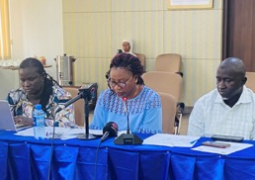
“The objectives of The Gambia Security Sector Reforms (SSR) include the establishment of civilian and democratic oversight mechanisms that guarantee non-occurrence of human rights violations by the security forces and, the development of national security policy and strategy frameworks focusing on security sector governance.”
Retired Col. Badjie was speaking on Friday during a press conference held at the Ministry of Higher Education conference hall in Bijilo. Officials said the presser was meant to update the public about how far they have gone on the much talked about SSR and the way forward among others.
The Gambian national ownership of the SSR, he said, remains a core component of the results indicators that include the restoration of public trust and confidence in the security sector, respect for human rights and the rule of law in line with standard international best practices and, full subordination of efficient and effective security institutions to democratic norms and civilian authority.
The country’s State Intelligence Services, Badjie said, had been engaged in training and conducting in-house as well on the job trainings, designed to inculcate the core values of loyalty, dedication, commitment, and professionalism in the delivery of the service’s core mandate of intelligence collection, processing, analysing and dissemination.
In the same spirit, he explained, a focus and reorientation of the SIS was put in place to serve, not as oppressors of the people but protectors of their security and well-being in concert with emphasis on human security above concentration on the state and regime centric aspect.
Badjie revealed that they have currently developed the SRR Assessment Report, National Security Policy, and National Security Strategy. According to him, another priority is a reform that will cover the most important security institutions which such as GAF, GID, GPF, GPS, GRA, DLEAG and the State Intelligence Service.
He added that they will be focusing on the development of the parliamentary civil control of the security sector.
He acknowledged that the next step is drafting of National Defence and Internal Security Policies, enactment of Vetting Agency, Enactment of Office of National Security, train and operationalise the vetting agency and also to develop counter-terrorism strategy.
Ebrima Sankareh, government spokesperson, responding to questions, confirmed that several people who are believed to be non-Gambians and enlisted in the service were dismissed. He, however, declined to confirm the number of people that were dismissed.
Yankuba Sonko, the minister of Interior on the case of Gorgi Mboob said: “In fact, I don’t think this matter needs to be talked about here, for the fact that there was an independent body that was constituted to investigate the matter. Certain recommendations were made and all of them have been implemented.”
On the issuance of National ID Card, the country’s Interior minister said there are procedures that are normally adopted which the desk officer of The Gambia Immigration needs to confirm that the ID card applicant is a Gambian. “In fact, all the cases we had so far are all referred with a view to enable them go back to their villages and come back with the right documentations, he said claiming that “nobody has so far been rejected.”
He added that there are massive reforms going at the prison. “I wish you could go to the prison, you will realise that there is indeed reform going on in terms of training inmates among others. Don’t only look at the structure outside.”
“SIS is no longer investigating criminal matters, so that means there is security sector reforms at the SIS. The army is not taking complaints from members of the civil society and the police attitudes towards individuals have also changed. We have seen a police officer torture somebody and the person is taken before an independent body,” he said, adding that this was not happening before.
Defence Minister Sheikh Omar Faye said the president is very serious about security reforms, adding that the SSR is not only the army but all other security institutions, claiming that Gambia is now adhering to best international practise.
“Now people are free, respecting human rights among others. Now if things happen you can easily walk to the courts. Nobody is beating anybody. We are trying to repent and reconcile our problems, learn from our mistakes, come together and move forward.”
Read Other Articles In Headlines




